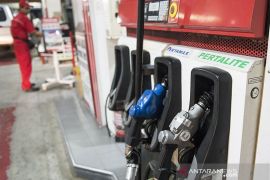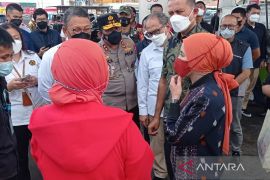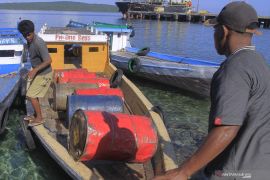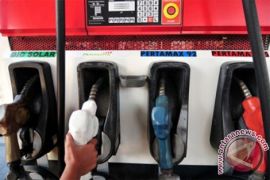"In principle, Pertamina always follow the directives of the government in distributing subsidized fuel oils and always consults with the Downstream Oil and Gas Regulator BPH Migas," Hanung said.Jakarta (ANTARA News) - State-owned oil and gas company Pertamina has been able to save 13 percent on diesel oil and 10 percent on premium gasoline after it carried out quota deduction in fuel distribution since November 19, 2012.
"The deduction on daily quota of refilling stations ranged at between 1 percent and 35 percent," Pertamina Commercial Director Hanung Budaya said here on Monday.
Since in the past week, during the quota allotment, long tailbacks at refueling stations had been taking place in various regions such as Batam, Pangkal Pinang, Bangka Belitung, Jambi, Bengkulu, Palembang, Tanjung Pinang, Lampung, Tarakan, Palangkaraya, Pontianak, Kuala Kutai, Purwakarta, Masalembo, Surabaya, Sidoarjo, Atambua, Flores and Kupang.
"Actually, Pertamina has prepared non-subsidized fuels at all Indonesian regions as alternative to the people," Hanung told a press conference at Pertamina office.
He said that long queues continued to take place at gas refilling stations because the people insisted on purchasing subsidized fuels. This indicated that the people were not yet fully prepared to purchase non-subsidized fuels while the subsidized one was still available.
"In a number of regions, the long tailbacks had the potentials to create social unrest and horizontal conflict such as what happened in West Kutai," he said.
In an effort to help maintain national security and stability, Pertamina on Sunday returned to normally supplying subsidized fuels while waiting for directives from the government.
Up to November 24, the realization of premium distribution has reached 25.2 million kiloliters and diesel oil 12.9 million kiloliters.
With the normal distribution of subsidized fuels, it is predicted that consumption of premium will exceed the quota by 450,000 kiloliters and diesel oil by 800,000 kiloliters.
"In principle, Pertamina always follow the directives of the government in distributing subsidized fuel oils and always consults with the Downstream Oil and Gas Regulator BPH Migas," Hanung added.
In an effort to restrict the use subsidized fuels, the government through the energy and mineral resources ministry is planning to launch a subsidized fuel-free beginning day next month.
The move is expected to save Rp500 billion to Rp600 billion in state budget funds, said Marshal Agus Barnas, chief of social analysis sub-team tasked with familiarizing the public with a plan to phase out the use of subsidized fuels recently.
Agus Barnas who is also deputy VII to the coordinating minister for political, legal and security affairs is in Bengkulu to get first hand inputs from the public about the plan.
The government will discuss the inputs from various regions including Bengkulu province with the central monitoring team to find the proper time to phase out subsidized fuels, he said.
President Susilo Bambang Yudhoyono launched an energy and water retrenchment movement nationwide on May 29, 2012. The movement is designed to increase energy security and maintain national economic growth.
To ensure the success of the energy retrenchment program, the government gradually bans cars owned by the government, state-owned companies and regional government-owned companies from using subsidized gasoline in Java and Bali.
Additionally, it also has launched an oil-to-gas conversion program and banned trucks owned by state plantation and mining companies from consuming subsidized diesel oil.
The government also bans state power utilities Perusahaan Listrik Negara (PLN) from using fuel oil to operate its new power plants. Instead, it encourages PLN to use solar energy, coal, natural gas, geothermal energy, and biogas.(*)
Editor: Heru Purwanto
Copyright © ANTARA 2012









